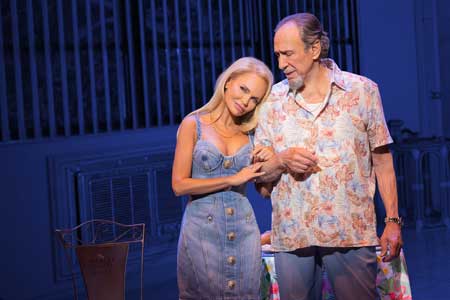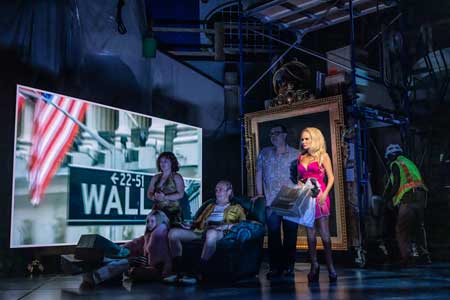Musical (2024)
Music and lyrics by Stephen Schwartz
Book by Lindsey Ferrentino
Based on Lauren Greenfield’s Documentary Film The Queen of Versailles
Directed by Michael Arden
Emerson Colonial Theater
Theater District, Boston
August 1-25, 2024
Music Supervised by: Mary Mitchell Campbell; Choreography by: Lauren Yalango-Grant and Christopher Cree Grant; Scenic and Video Design: Dane Lafrey; Costume Design: Christian Cowan; Hair and Wig Designer: Cookie Jordan; Lighting Design: Natasha Katz; Sound Design: Peter Hylenski
With Kristen Chenoweth (Jackie), F. Murray Abraham (David), Melody Butiu (Sofia), Stephen DeRosa (John), Greg Hildreth (Gary), Tatum Grace Hopkins (Jonquil), Isabel Keating (Debbie), Nina White (Victoria), Anna Bakun (Sheri & Others), Travis Murad Leland (Ray & Others), Diana Huey (Kimberly & Others), Cassondra James (Marie & Others), Andrew Kober (Pageant Host & Others), Pablo David Lauceria (Louis & Others), Michael McCorry Rose (Ron & Others), Moving Company: Yeman Brown, Drew Elhamalawy, Sara Esty, KJ Hippensteel

F. Murray Abraham as David
in “The Queen of Versailles”
Photo: Matthew Murphy
Courtesy of Emerson Colonial Theater
Jackie (Kristen Chenoweth) comes from a modest family, but she has big dreams. She marries early, manages to enter a beauty contest for married women, and then, leaves her abusive husband and newly single with a young child, pursues her larger ambitions. By chance, she goes to a party where she meets David Siegel (F. Murray Abraham), a real estate magnate who has made a fortune building time-share estates all over the country. Fate brings them together and with his vast wealth they pursue the idea of building a palace much like Versailles in Orlando, Florida. But 2008 is soon upon them and fortunes change, especially for the real estate world, which spells significant consequences for Jackie, David and their family.
There is a lot to be said for this production which features some terrific staging, wonderful choreography, great singing, and a lot of other factors which contribute to a lively and entertaining, though ultimately poignant, show. Early on, especially, there is a lot of playoff between the setting of the original Versailles, replete with costumes and decorations of the era, and the contemporary world. The costumes and the setting for the 17th century parts are particularly colorful and interesting. And the score by Stephen Schwartz takes particularly inventive and inspired turns when brining in themes from that era.
Indeed, the heart and soul of this show is carried forth by its star, Kristin Chenoweth, who carries a good deal of the echoes of the role which made her famous, that of Glinda, the superficially goody-two-shoes witch of that other supremely successful Stephen Schwartz outing Wicked (2003). (Note: the film version is due out later this year!) In that show, Chenoweth’s incredibly bouncy and verve-filled presence filled the role of Glinda with perfection, yielding a quite interesting and complex version of it. That role, perfect for Chenoweth, is about a glistening presence who underneath is a much more complicated and less glistening figure. In Wicked, with her darker counterpart Elphaba, she adeptly plays out the knotted and interesting interchanges between the apparently wonderful and the apparently awful, a relationship, according to Wicked‘s wisdom, much more subtle than it might appear.
The narrative in The Queen of Versailles is less nuanced. Jackie is irrepressible and positive, a little like Glinda, but determined to realize her desires for power, wealth and glitz. There is something continuously charming about her, despite these intense desires for wealth and all of its trappings Despite her unending hunger for glitziness and the desire for more and more of it, Chenoweth’s Jackie continues to have a down-to-earth charm. There is little of the desperately miserable or tortuous about her character, making it an unexpectedly sweet portrayal, but it also makes for a somewhat wanting narrative.
The first part of this show really shines, with all kinds of snappy lyrics and staging. The choreography is terrific, the set is terrific and the music quite varied and interesting. And Chenoweth holds it together with a magnetic presence that persists throughout that first act. F. Murray Abraham, who plays David, is also very good, offering a very convincing interpretation of this highly successful but also quite down to earth and loveable consort of Queen Jackie.
In the second part, after the fortune and empire begin to collapse, the narrative takes a somewhat less persuasive turn. One begins to wonder where the substance of the story is going; the quite effective buildup in the first act struggles to find focus in the second. There is not all that much that changes in Queen Jackie’s stance or outlook, and despite some tragic consequences of her endless pursuit of grandeur, no lesson really ever seems to get learned.

Nina White as Victoria
F. Murray Abraham as David
Kristen Chenoweth as Jackie
in “The Queen of Versailles”
Photo: Matthew Murphy
Courtesy of Emerson Colonial Theater
In this second half, the show seems to want to find something, somewhere to go, some drama to kindle amid all the glamor, but never seems to find it. This does not mean that Chenoweth does not continue to sparkle – she does – but one wonders what the show would amount to without her to keep its heart pumping. Over time, unless the show finds a series of stars with Chenoweth’s star-power and talent for fusing charm, humor, glamor, desperation and obsessiveness in one potent package, one wonders whether the show would hold up without her.
The folksiness that contributes to some of the dramatic evolution in the second part – particularly brought forth by Jackie’s parents – reminds one of the speech that Senora Panza gives to Sancho Panza halfway through the great Spanish epic Don Quixote. Sancho is seeking power and influence through his association with Don Quixote, but his wife tries to talk him into realizing that his life is okay as it is without all that power and influence. But it takes some considerable further adventures – and hundreds of pages – for Sancho to realize that she’s right. In The Queen of Versailles some of that element is present, but the dramatic requirements of the show – unlike the Cervantes epic – would require more focus and craft in the second half to bring that message home. It tries to do so, but does not quite succeed, effecting more the sense of air leaving the room rather than a dramatically satisfying conclusion.
In this show, Schwartz’s music is always bouncy and entertaining, and, at some points it is interesting. The interleaving of the motifs from the 17th century with the more contemporary jazzy riffs is sometimes quite appealing. There are other times when a bit more of the standard Schwartz catalog of Broadway music idioms comes through as overplayed. A lot of the lyrics, particularly in the first half, are very funny and witty, and many of the lines in the spoken parts are also very sharp. At one point, the Queen, after her marriage to David, says hilariously who knew that one could become a wife, a billionaire and a Jew in one day? There are plenty of snappy and funny lines like that and they come off very well, and Chenoweth is a master and delivering them.
Though Schwartz’s Wicked has a terrific narrative based on the 1994 Gregory Maguire novel of the same name, Schwartz’ much earlier effort, Pippin (1972) is an example of something that, though it became quite successful, has a very thin narrative. The Queen of Versailles portends in its first part to show some of the interest and complexity of the sort that come through in Wicked, but in the second part shows more of the what-does-this-amount-to feeling of Pippin.
At the performance I attended, the audience roared to its feet at the end, thrilled with what it saw. Indeed there were some great things about this show, and it was very nice that those in attendance were electrified by those and less diminished by what the story line did not quite achieve.
Overall: Some great music, lyrics, singing, acting, staging, choreography, a focused and memorable central portrayal by Kristen Chenoweth, with a narrative that does not quite come together, particularly in the second part.
– BADMan (aka Charles Munitz)
Leave a Reply